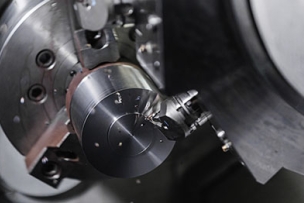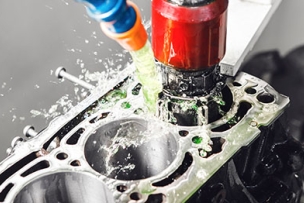Fortunately, not all cost-cutting measures require major capital investments or sweeping process overhauls. Two of the most effective strategies are also among the most accessible: implementing a structured preventive maintenance (PM) program and rethinking supply purchases to prioritize performance and value. Both can help shops avoid costly downtime and reduce part costs, all while maintaining the quality and output their customers expect.
Lowering Maintenance Costs
The first cost-saving strategy comes from an often overlooked direction. “Most shops don’t have the time, equipment or training to clean their machines properly. So they let the operators or the maintenance crew do it, and it ends up taking twice as long as it should, and it still doesn’t get done right.”
That’s according to Robert Mery, a regional sales representative with Houston-based Fluid Service Technologies (FST), who says a professional cleaning team can service even large machine tools and flexible manufacturing systems in a weekend, cutting downtime and restoring machines to like-new condition.
He adds that machine shops often underestimate just how much poor fluid maintenance and dirty machines can cost them, not only in reduced tool life and part quality but also in operator health, safety issues and overall equipment efficiency. “We recommend every machine be deep-cleaned at least once a year,” Mery points out. “A lot of shops only call when there’s a big problem—failed coolant pumps, dermatitis outbreaks, bacterial sludge—but we’re working with companies all across the country, shifting them to a preventive cleaning strategy that avoids all this.”
FST offers both one-time cleanings and subscription-based programs where crews rotate through a facility’s machines on a set schedule. In addition, the company also provides cutting fluid management services, using a mobile app called TechTool to log refractometer readings, pH levels and fluid top-offs.
The result? Longer coolant life, improved tool life, better surface finish on parts and less drag-out and waste disposal cost. Says Mery, “When you track and manage your fluids consistently, you can dramatically reduce spend on both coolants and cutting tools.”
Smarter Products, Fewer Interruptions
Mandy Pack, product manager at ITW Pro Brands, offers similar advice. “If you maintain your facility well with quality products and processes, then you are saving money in the long run. Our solutions may not be the least expensive, but they often last longer, reduce maintenance cycles and extend the life of materials.”
As its name suggests, ITW Pro Brands is an MSC supplier that offers a broad range of professional-grade products, from cleaners and corrosion inhibitors to metalworking fluids and mold release agents. And as Pack indicated, these might not seem to be the lowest-cost solutions, although the reality is that—time and time again—performance is far more important than price.
Technical Sales Engineer Greg Bruce agrees, pointing to the company’s line of high-performance greases and lubricants as an example. “We use high-quality raw materials and suppliers because our priority is to deliver the highest-performing product possible,” he said. “So let’s say you’re currently applying lubricant to your equipment every week and ours only needs to be applied monthly—that savings in labor and downtime adds up quickly.”
Pack seconds this, suggesting that one of the most quietly effective but overlooked ways to cut labor costs and machine downtime is to reduce the number of trips employees make to the sink. To this end, ITW offers SCRUBS in-a-Bucket®, a heavy-duty hand-cleaning towel.
“That trip to the sink causes a break in the production flow. Workers end up getting distracted, maybe stopping to chat with a friend about last night's football game while their machine sits idle,” Pack says. “We talk a lot about downtime related to machines, but nobody talks about the downtime related to hand-washing. SCRUBS keeps them at their station and on task.”
Troy Boeckman is a key account manager with ITW Pro Brands. He notes that while some shops continue chasing the lowest price per item, others are looking at the bigger picture: how often they have to reapply a corrosion inhibitor, for instance, or replace an ineffective coolant; in these and countless other examples, it’s not the initial product cost that matters, but rather the labor, downtime and disposal costs that follow.
“Take something as simple as a DYKEM marker, where flippable nibs and valve-actuated tips allow workers to use every last drop of paint without the risk of dry-out,” Boeckman says. “You’re not running back to the tool crib, and you’re not throwing away markers that still have paint in them. Time, costs and waste all go down.”
Another approach to waste reduction is minimum quantity lubrication (MQL). Bruce explains that, unlike traditional flood cooling, MQL delivers a precise mist of biodegradable lubricant directly to the cutting zone. Not only do you eliminate the maintenance and disposal hassles, but you dramatically increase tool life, improve part surface finish and reduce health risks to the operator.
The company also emphasized the purchasing advantage of its portfolio approach. MSC stocks eight ITW brands, allowing buyers to consolidate multiple product lines into one order. According to Boeckman, this simplifies everything from invoicing to receiving, “and when your MSC rep can help you find the best greases, cleaners, markers and coolants all in one visit, that’s real value.”
Learn more: Your Machine Maintenance Checklist.
Exclusive Means Performance
When manufacturers think about saving money on their tooling and supplies, the first assumption is often that descriptors such as “budget” or “select” mean low quality. But MSC Industrial Supply challenges this thinking by offering high-performing products—many sourced from U.S. manufacturers—at prices 10 percent to 20 percent below national brands.
“We partner with some of the biggest and best-known manufacturers in the industry to produce our private-label products,” says Byron Rodger, senior category manager for MSC’s Exclusive Brands. “That lets us deliver a level of performance and consistency our customers can trust at a price that makes sense, all of which are critical considerations in today’s economic climate.”
Rodger explains that the Exclusive Brands offering is built around specific market needs, such as those of job shops, aerospace OEMs, and higher-volume manufacturers in the automotive and appliance industry. For example, Accupro serves as one of MSC’s many high-performance tooling lines, while Hertel targets general-purpose jobs, and the Value Collection supports more price-sensitive customers. On the MRO side, the Exclusive Brands label includes PRO-SOURCE for janitorial and facility supplies, PRO-SAFE for personal protective equipment (PPE), and Tru-Maxx for abrasives.
Despite the lower pricing, MSC’s tools undergo extensive quality assurance and benchmarking. “We run side-by-side tests against branded products in our quality control lab to make sure our tools either meet or outperform on key metrics,” Rodger says. “The goal is to offer an alternative that saves money without sacrificing quality or uptime.”
Most of MSC’s metalworking Exclusive Brands are sourced from U.S. manufacturers, though Rodger acknowledged that the company imports some of its products from Europe and Asia. “We’re very selective about our overseas partners, and we’ve invested heavily in quality testing,” he explains. “But we’re also actively working on country-of-origin diversification, including bringing some drill production back to the United States to reduce tariff impact and reassure customers concerned about Chinese sourcing.”
To support customers whose processes are locked in place after first article inspection (FAI)—those engaged in aerospace and defense work, for instance—MSC builds inventory buffers and works closely with suppliers to maintain stocks of finished and semi-finished goods for faster turnaround. The company also integrates Exclusive Brands into its vending and inventory control programs.
“You’ll see our Exclusive Brand cutting tools and safety supplies stocked in vending machines at customer sites all over the country,” Rodger says. “These are products that help shops manage their costs without compromising performance—and that’s what everyone needs right now.”
What cost-saving strategies have made the biggest impact in your shop without compromising quality? Tell us in the comments below.





Talk to Us!
Leave a reply
Your email address will not be published. Required fields are marked *